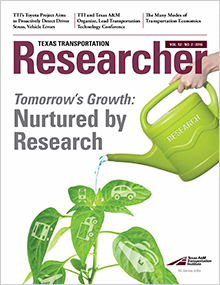NHTSA’s Rosekind Addresses TTI’s Annual Traffic Safety Conference
NHTSA Administrator Mark Rosekind was the keynote speaker for TTI’s Traffic Safety Conference.

Advanced vehicle technologies represent a “safety innovation revolution,” according to Mark Rosekind, head of the National Highway Traffic Safety Administration (NHTSA). Rosekind met with TTI leaders and researchers and was keynote speaker for the 2016 Traffic Safety Conference, which TTI hosted in College Station, Texas, June 6–8.
“Over the last 50 years, [seat belts and air bags] have saved 613,501 lives,” the administrator told the 300 people in attendance. “The advanced safety technologies we are seeing today represent us being on the cusp of a safety innovation revolution. That’s what’s coming.”
Rosekind praised attendees, who included law enforcement, safety experts from the public and private sectors, municipal transportation planners, and university-based transportation researchers.
“[You’re] amazing, passionate, dedicated people who are saving lives in their communities,” he said. “All of you are beacons. You’re the folks we need to support as you go about saving lives and preventing crashes. The work you do makes a difference. No one will ever say thank you enough.”
Rosekind also told the luncheon group that a lot of work is left to do, pointing to the 32,675 deaths resulting from crashes in 2014, the latest year of safety statistics captured by NHTSA. The 2015 fatality numbers, he previewed, will show an increase when the report is released soon. As part of the solution, Rosekind pointed to automated vehicle technologies, which could hold “massive, life-saving potential.”
He applauded the recently announced RELLIS Campus at Texas A&M University, which will be partially dedicated to transportation technology research. “The interesting question is — how many lives can be saved by tech? We really are excited to find out that answer,” he said.
Each year, the Traffic Safety Conference, sponsored by the Texas Department of Transportation and TTI, brings together public policy makers, traffic safety practitioners, law enforcement, traffic engineers, public health officials and many others passionate about traffic safety for a three-day forum. At this year’s conference, more than 300 attendees broke into 16 different sessions. Topics included engineering, roadside safety, outreach campaigns, pedestrian and bicycle safety, data analytics, safety cities, motorcycle safety, traffic safety culture indexing, and Vision Zero, a multinational road traffic safety project begun in 1997 in Sweden with the goal of zero fatalities or serious injuries resulting from road traffic.
Spiegelman Receives Don Owen Award

Clifford Spiegelman, senior research scientist at TTI and distinguished professor with the Texas A&M Department of Statistics, has received the Don Owen Award from the San Antonio Chapter of the American Statistical Association (ASA). The award was presented to Spiegelman this spring during the Conference of Texas Statisticians at Trinity University. Spiegelman was selected for his “excellence in research, statistical consultation, and service to the statistical community.”
Spiegelman is an author, researcher and expert in statistical and environmental forensics. One of the highlights of his 40-year career includes the international attention he received in 2007 for his work on computational bullet fragment analysis, which challenged the evidence for the lone-gunman theory in the John F. Kennedy assassination.
“This is a high honor, and I am grateful to receive it,” Spiegelman says, “I think the award reflects well on the people who work with me.”
TTI Secures Patents Related to Embassy Protection, Freight Movement
Working with officials from the U.S. State Department, three TTI researchers have helped design a new safety barrier that’s easier and less costly to repair than current systems now used around embassies and other sensitive compounds. Their invention, Surface Mount Wedge Barrier, was recognized this spring during the annual Patent and Innovation Awards Luncheon held at the George Bush Presidential Library.

“We designed a prototype that has been crash-tested at the Riverside Campus,” says TTI Assistant Agency Director Dean Alberson, manager of the Institute’s Crashworthy Structures Program. “We were able to easily remove the aboveground damaged section after the full-scale impact. This allows a rapid replacement of the upper section since the in-ground portion of the system was undamaged. This will save time and money each time these barrier systems suffer a nuisance or even full-scale hit.”
Along with individuals from the State Department, Michael Brackin, D. Lance Bullard and Alberson were awarded patent #8,956,072 by the U.S. Patent Office.
TTI Assistant Agency Director Stephen Roop, who developed the innovative Freight Shuttle System (FSS), was also recognized. Roop has been awarded numerous patents related to the project, including patent #9,176,076 — Cargo Inspection System. The privately funded FSS, now in the prototype stage, is an electric- powered system that combines proven technologies in a new way.
“The system allows for a 100 percent inspection of the freight moving between the United States and Mexico, and provides for the information flow between U.S. Customs and Border Protection and its Mexican counterpart,” Roop explains.
Transportation Technology and the Law: TTI Takes Part in Symposium
TTI researchers recently played a major role in a Texas A&M School of Law conference dedicated to the future of transportation. The Changing Landscape of Transportation: Technology, Data and the Law was held in Fort Worth April 1. The symposium was organized and hosted by students associated with the Texas A&M Law Review.

Ginger Goodin, director of TTI’s Transportation Policy Research Center, moderated two sessions of the symposium — Emerging Intersections in Transportation and Automated Controls: Legal and Ethical Concerns.
“Transportation will certainly look different in the next decade with cars and infrastructure talking to each other, not to mention the advent of self-driving cars,” Goodin says. “But legally, there’s a lot to consider. This symposium was important in advancing the dialogue between those responsible for implementing advanced transportation and those responsible for legislating it.”
Allan Rutter, head of TTI’s Freight Mobility Division, also spoke at the symposium. His presentation examined how technology is affecting the freight industry. “Technology has certainly changed the way shippers and carriers work together, and freight regulations are changing along with the technologies,” Rutter says.
